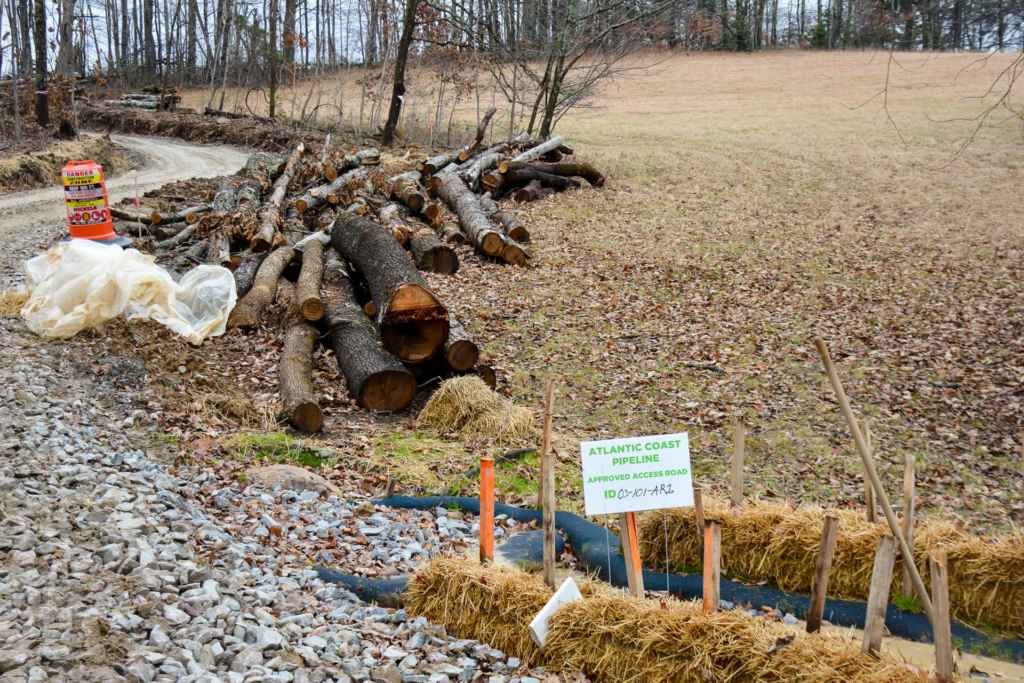BUCKHANNON – The Atlantic Coast Pipeline isn’t authorized to build across any rivers or streams until further notice after the U.S. Army Corps of Engineers suspended a permit that had enabled the water crossings last week.
In the whole of West Virginia, the revocation of what’s known as Nationwide Permit 12 will affect .3 miles of pipeline located in streams and 1 mile in wetlands, Samantha Norris, a spokesperson with Dominion Energy, said Monday.
Dominion is the lead developer and primary owner of the 600-mile-long natural gas pipeline, a project also involving Piedmont Natural Gas, Southern Company Gas and Duke Energy.
“In Upshur County, this voluntary suspension impacts three stream crossings and one crossing on the Buckhannon River,” Norris wrote in an email to My Buckhannon.
Norris said the temporary stay of the permit will impact less than 15 percent or 86 miles of the pipeline’s route, which originates in Harrison County, West Virginia, and traverses Lewis, Upshur, Randolph and Pocahontas counties before winding its way into Virginia and North Carolina, where it ends in Robeson County.
On Nov. 20, several district U.S. Army Corps of Engineers offices – including ones inPittsburgh, Pennsylvania, Norfolk, Virginia and Wilmington, North Carolina – sent letters to ACP’s headquarters in Richmond, Virginia, ordering ACP to halt all construction of the natural gas pipeline across waterways in those districts, according to an article in the Charleston Gazette-Mail.
On Monday, Norris emphasized the suspension was voluntary and said ACP had requested the stay of its coverage under the Nationwide Permit 12. She said the Army Corps’ districted offices sent letters to ACP’s headquarters only after ACP had requested those districts write the letters.
“Yes, the Atlantic Coast Pipeline has requested a voluntary suspension of its coverage under the U.S. Army Corps of Engineers Nationwide Permit 12 to allow time for resolution of permit questions,” Norris explained. “We are confident that this issue will be resolved in a timely manner and we do not expect the project schedule to be affected by this voluntary suspension.
“We successfully completed West Virginia summer construction with stay provisions in place and expect ACP’s fall and winter construction will also proceed in a productive manner in compliance with the stay provisions,” Norris added.
The voluntary suspension comes on the heels of a Nov. 7 court order handed down by the Fourth Circuit of the U.S. Court of Appeals that essentially invalidated the water-crossing permit, the Nationwide 12 Permit. The court’s ruling was issued after lawyers for environmental advocacy groups including the Sierra Club, West Virginia Rivers Coalition and W.Va. Highlands Conservancy filed suit, asking the court to invalidate the permit because it didn’t meet two conditions, according to the Gazette-Mail.
On Monday, Angie Rosser, executive director of the West Virginia Rivers Coalition, told My Buckhannon that certain state-specific conditions are attached to Nationwide Permit 12. In West Virginia, the two conditions the permit failed to meet were the requirements that stream crossings be completed within 72 hours and that any construction through waterways not impede fish from swimming upstream or downstream.
Rosser said ACP’s voluntary suspension is an acknowledgement that “as of right now, the pipeline is not in compliance” with the Army Corps’ permit.
Rosser explained that in 2017, the W.Va. Department of Environmental Protection approved the above-referenced conditions attached to the nationwide permit – the ones that aren’t being met now – and that currently, the DEP is reviewing proposed revisions to those special conditions.
In other words, the DEP is considering whether to modify or leave intact the conditions, Rosser said.
“We’re expecting the decision from the DEP to come out any day,” Rosser said. “Are those conditions going to change?
“What’s unprecedented about this, is that these conditions only come up for review every five years, and now they’re saying, ‘We want to make these modifications,’ and they’re the same ones the pipelines are being challenged on,” Rosser added. “It brings a lot of uncertainty to the whole process when the rules change in the middle of these pipelines being built.”
Dominion maintains the ACP is the most thoroughly review infrastructure project in the area.
“The ACP has been the most thoroughly reviewed infrastructure project in the history of our region,” Norris said. “This voluntary suspension only reinforces the incredibly high standard that is being applied to the project.”













